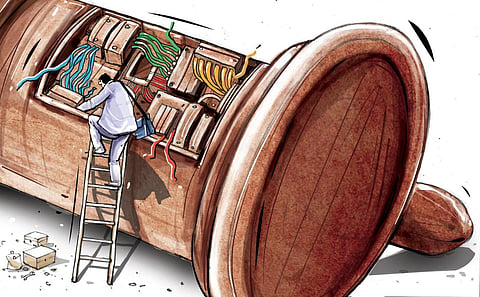

On March 31, a Supreme Court bench comprising Justices Sanjay Kishan Kaul and Aravind Kumar expressed disapproval of trial courts -- this time, a magistrate court in Bihar -- for uncaringly dismissing a bail application. The bench remarked: “It does appear to us that despite various orders passed by this court, either the trial courts are not appreciating the ambit of the orders of this court or for best reasons consider it appropriate to keep dismissing the applications for bail."
Not long ago, on November 20, 2022, speaking at a function held by the Bar Council of India to felicitate him on his appointment as Chief Justice of India, Justice Chandrachud addressed the issue of the higher judiciary facing a large number of bail cases. Chandrachud said the higher judiciary is getting "flooded" with bail matters because of the reluctance at the grassroots level to grant bail.
And he was not evasive in zeroing in on the 'why'. “Why judges at the grassroots are reluctant to grant bail is not because they don't have the ability, not because the judges at the grassroots don't understand the crime," said Chandrachud, adding there is a "sense of fear" among the judges at the grassroots that if they grant bail, "will somebody target me tomorrow on the ground that I granted bail in this heinous case".
“This sense of fear nobody talks about but we must confront it because unless we do that, we are going to render our district courts toothless and our higher courts dysfunctional," said Chandrachud.
The law lords were not mincing their words in suggesting why trial courts continue this improper course. The law of arrest in India is governed primarily by the Code of Criminal Procedure (CrPC), which outlines the powers and procedures related to arrests by the police. According to the CrPC, police officers may arrest a person without a warrant if they have reason to believe that the person has committed a cognizable offense or is about to commit one. The officer must inform the person being arrested of the grounds for arrest and the right to bail.
In non-cognizable offenses, a police officer may only make an arrest with a warrant, or with the permission of a magistrate. If a person is arrested, they must be produced before a magistrate within 24 hours of arrest, excluding the time required for the journey. The magistrate will then determine if the arrest was legal and if the person should be remanded in custody or released on bail.
It is important to note that the law also provides certain safeguards against arbitrary arrests. For example, a person cannot be arrested for a non-cognizable offense without a warrant, and in the case of cognizable offenses, the police must have reasonable grounds to believe that the person has committed an offense before making an arrest.
The Pitamaha of Justice, V R Krishna Iyer, was a staunch advocate of the principle that "bail is the rule and jail is the exception," which means that the courts should grant bail to accused persons unless there are compelling reasons to keep them in custody. His landmark judgments include Gudikanti Narasimhulu vs. Public Prosecutor, High Court of A.P. (1978) where Iyer held that the power to grant or deny bail is not to be exercised in a mechanical manner, but should be based on a careful consideration of the facts and circumstances of each case.
And in Hussainara Khatoon vs. Home Secretary, State of Bihar (1979), Iyer held that the right to a speedy trial is an essential part of the right to life and personal liberty guaranteed by the Constitution of India, and that the courts should take into account the prolonged detention of an accused person while considering their bail application.
Instead of Justice V R Krishna Iyer's judgments on bail having a significant impact on the criminal justice system in India, and his legacy inspiring judges and lawyers to uphold the principle that bail is the rule and jail is the exception, the opposite appears to be true in trial courts in 2023.
It is settled law that arrest is not a punishment. But in Indian social conditions, it carries a stigma and accused are perceived to be guilty, the moment they are arrested.
The Supreme Court has always said that an accused is presumed innocent until proven guilty in a court of law. As in State of U.P. vs. Deoman Upadhyaya (1960), where it held that the burden of proving the guilt of an accused lies solely with the prosecution, and until the prosecution proves the guilt beyond a reasonable doubt, the accused is entitled to the benefit of doubt. It was recently reiterated by the apex court in Sanjay Thakrar vs. Government of India (2021) that an accused is presumed innocent until proven guilty in a court of law.
Read more web exclusives from our Web Scrawl series here
Nevertheless, all of us are privy to the bawling on our idiot boxes, leaving an accused, on arrest, guilty in the court of public opinion.
An arrest is not the ‘first resort’ in other democracies like the US and UK. The police administration just keeps tabs on the accused. Only where the accused, for recorded reasons, was perceived as capable of tampering with evidence or likely to escape the clutches of law, would arrest be called for.
However, the reality in India is that our police administration always has ‘good reasons’ to arrest an accused, for any and every cause. And magistrates appear to have ‘best reasons’ to deny them bail. The only reason behind this unhealthy state of affairs as Justice Antonin Scalia famously said is, 'no accountability, mate, no accountability'. Shame.
(Narasimhan Vijayaraghavan is a practising advocate in the Madras High Court)